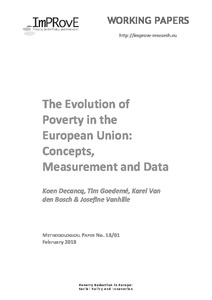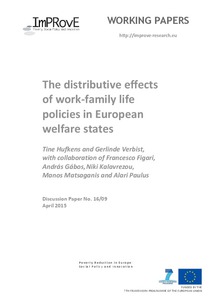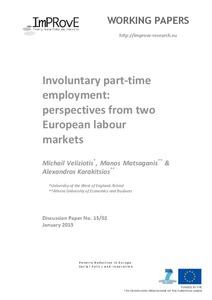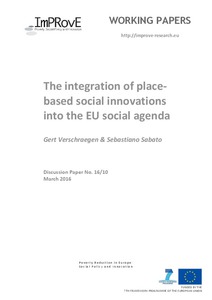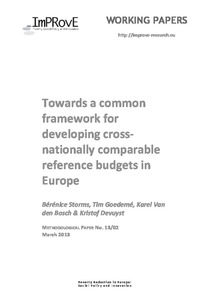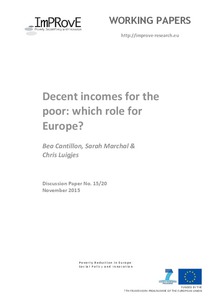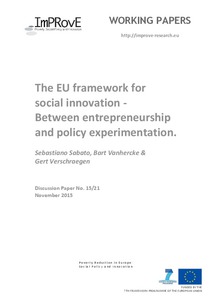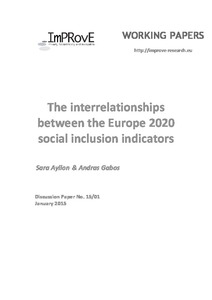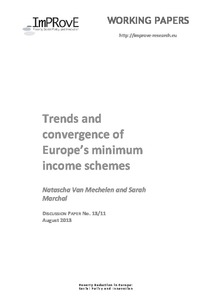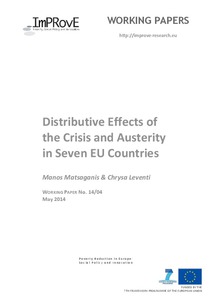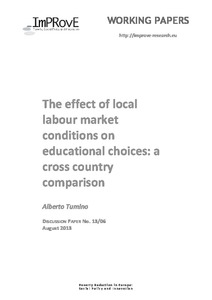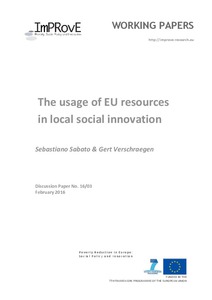-
1by ImPRovE, Antwerp, Decancq, Koen, Goedemé, Tim, Van den Bosch, Karel, Vanhille, Josefine“…"This paper considers the measurement of poverty in the European Union (EU). Starting from a definition of poverty that is suitable for the European context, a flexible measurement framework is proposed based on the Foster-Greer-Thorbecke class of poverty measures. …”
Published 2013
TEXT -
2
-
3“…In this paper we focus on Greece and the UK, two European labour markets characterised by different institutions, but also a common trend of rising involuntary part-time (from different levels). …”
TEXT -
4“…First, we argue that the Active Inclusion notion developed by the European Commission in its 2008 Recommendation on the active inclusion of persons on a large distance of the labour market provides a useful device to categorize current activation strategies towards minimum income protection (MIP) recipients. …”
TEXT -
5“…"This report examines how place-based socially innovative policies and actions can be better integrated into the broader European Union (EU) social agenda. On the basis of previous work and a roundtable taking place in the context of the Improve project, it a) identifies some main challenges for upscaling and consolidating place-based social innovation throughout the European multi-level governance system; b) analyses whether social innovation dovetails with the broader European policy goals of territorial cohesion and public participation, and c) proposes some cautious policy recommendations with regard to how EU resources can be used to better support socially innovative practices. …”
TEXT -
6by ImPRovE, Antwerp, Decancq, Koen, Goedemé, Tim, Van den Bosch, Karel, Vanhille, Josefine“…"This paper considers the measurement of poverty in the European Union (EU). Starting from a definition of poverty that is suitable for the European context, a flexible measurement framework is proposed based on the Foster-Greer-Thorbecke class of poverty measures. …”
Published 2013
TEXT -
7“…This begs the question whether a more performant EU level involvement in the field of social policy is conceivable, within the constraints set by the European Treaties. In this paper, we argue that European minimum standards are the place to start. …”
TEXT -
8“…Our analysis also provides insights into the complex and multi-layered European policy architecture for underpinning social innovation.…”
TEXT -
9“…Our results indicate that the three social indicators of the EU2020 strategy are capturing different aspects of economic hardship in the majority of European countries analysed. We show that the three processes are affected by a considerable degree of genuine state dependence but weak evidence for one-year lagged feedback effects (with the exception of the Central-Eastern European countries where feedback loops between the three segments are found. …”
TEXT -
10“…"This paper aims to contribute to the debate on whether or not European welfare states converge by assessing trends and patterns of convergence and divergence of European minimum income schemes in the period 1992/2001-2012. …”
TEXT -
11“…Focusing on studies examining the US, Canada and several European countries, we compare and discuss their methodologies and empirical results as well as their implications for child care policies. …”
TEXT -
12“…"In this paper, we analyze poverty dynamics in Europe for the period 1994-2001 using the European Community Household Panel (ECHP) and for the period 2005-2008 using the European Union Statistics on Income and Living Conditions (EU-SILC). …”
TEXT -
13“…"European welfare states are under considerable stress. …”
TEXT -
14“…We compare liberal regimes (Ireland and the UK) which policies aimed at attracting highly-skilled immigrants to meet these countries’ economic needs in highly-skilled jobs with those of Southern European countries (Italy, Spain and Greece), which pursued more lax and unselective policies, trying to attract labour force for low-skilled jobs in their countries’ economies. …”
TEXT -
15“…Building on the theoretical predictions of the human capital investment model and on previous evidence, we study the relationship between prevailing labour market conditions and schooling decisions in three European countries: Italy, Germany and the UK. The paper contributes to the existing literature by explicitly modelling the role of home ownership in affecting the response to incentives coming from the labour market. …”
TEXT -
16“…"Over the last few decades, the European Union (EU) has made available a number of resources for promoting and supporting social innovation in the field of poverty and social exclusion (cf. …”
TEXT -
17“…Results suggest that Italian households might alter their childcare and labour supply decisions substantially if the coverage rate of formal childcare increases, in particular if the increase would correspond to the increase needed to reach the European target in the Southern regions. Overall, increasing child care coverage is estimated to be more effective in enhancing labour incentives than decreasing existing child care costs, at the same budgetary cost. …”
TEXT -
18by ImPRovE, Antwerp, Gábos, András, Branyiczki, Réka, Lange, Barbara, Tóth, István György“…"The paper aims to contribute to a better understanding of how employment change relates to changes in poverty in the European Union’s Member States by looking at both micro and macro level correlations. …”
Published 2015
TEXT -
19“…"This paper is a critical assessment of the indicator which has been developed to measure the relative number of people living in households with low, or very low, work intensity which is part of the Europe 2020 target set to reduce poverty and social exclusion in the European Union. It considers the way the indicator is defined and calculated, in particular, the age group taken to be of working-age, the treatment of students, the threshold defined to denote low work intensity and the extent of missing cases. …”
TEXT -
20by ImPRovE, Antwerp, Oosterlynck, Stijn, Kazepov, Yuri, Novy, Andreas, Cools, Pieter, Wukovitsch, Florian, Saruis, Tatiana, Barberis, Eduardo, Leubolt, Bernhard“…The paper starts with a brief account of the emergence, evolution and classification of the European welfare states and then goes on to problematize two aspects of contemporary thinking about the welfare state in its various forms, namely methodological nationalism and state-centrism. …”
Published 2013
TEXT

